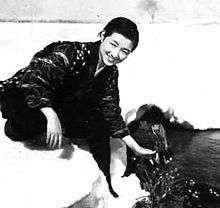Horse (1941 film)
| Horse (Uma) | |
|---|---|
 Hideko Takamine as Ine | |
| Directed by |
Kajiro Yamamoto Akira Kurosawa (uncredited) |
| Written by |
Kajiro Yamamoto Akira Kurosawa |
| Starring | Hideko Takamine |
| Music by | Jisho Kitamura |
Production company | |
| Distributed by | Toho Company Ltd. |
Release date |
|
Running time | 129 minutes |
| Country | Japan |
| Language | Japanese |
Uma (馬, also known as Horse) is a 1941 black-and-white Japanese film directed by Kajiro Yamamoto and starring Hideko Takamine, whom Yamamoto had directed in his film Composition Class (Tsuzurikata Kyōshitsu) three years before. Uma was actually completed by assistant director Akira Kurosawa. It follows the story of Ine Onoda, the eldest daughter of a poor family of farmers, who raises a colt from birth and comes to love the horse dearly. When the horse is grown, the government orders it auctioned and sold to the army. Ine struggles to prevent the sale.
Overview
The film is a tale about a young girl and the colt she raises from its birth. But it is also about the struggle of farmers existing on the edge of poverty. Akira Kurosawa is credited as the film's production coordinator, which is equivalent to first assistant director. It is the last film Kurosawa was to work on as an assistant before starting his own directing career. The film took three years to plan and a year to film. Kajiro Yamamoto had to commute to the far mountainous location but had to turn his attention to his money making comedies in Tokyo and so he left production in the hands of his assistant, Kurosawa.[2]
Cast
- Hideko Takamine as Ine
- Kamatari Fujiwara as Jinjiro Onoda, Ine's father
- Chieko Takehisa as Saku Onoda, Ine's mother
Plot
A young girl, Ine Onoda, from a poor village family wants nothing more than to own a horse. Her family soon takes in a pregnant mare which they have signed on to care for over the winter. Financial troubles push the family towards the edge of ruin and neither they nor the horse is eating much. The horse becomes very ill and the vet determines only grass will save it. Ine walks many miles through the snow to a hot spring where grass grows year round and saves the horse's life. That spring it gives birth to a colt and it looks as if Ine will finally have her horse. But when the colt is grown, the government orders it auctioned and sold to the army, as unpaid bills force the family to sell the colt. Ine takes a job in a mill to save money to buy her horse back. On the day of the auction, she is outbid and cries as the horse is led away for the last time.
References
- ↑ (in Japanese) http://www.imdb.com/title/tt0034333/releaseinfo?ref_=ttfc_sa_1 accessed 7 February 2014
- ↑ "Yamamoto Kajirō". Nihon jinmei daijiten + Plus (in Japanese). Kōdansha. Retrieved 22 June 2017.
External links
- Uma (1941) on IMDb